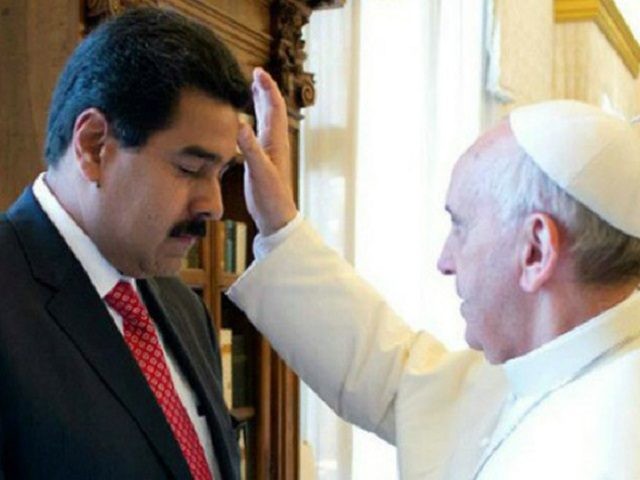In a major stand-off between Venezuelan dictator Nicolás Maduro and the Catholic bishops of the country, both groups have appealed to Pope Francis for his support and mediation of the conflict.
Last week, the leadership of the Venezuelan bishops’ conference traveled to Rome to meet with the Pope, after which the bishops declared that the pontiff told them they have his “full trust.”
“He told us that that he’s very close to us and very well informed about the situation of Venezuela, and very close to the suffering of the people,” said Archbishop Diego Padrón, president of the Venezuelan Bishops’ Conference.
“And he also told us that we have his full trust, and we have a great communion with him and his magisterium, so there’s no distance between him and the conference,” he added.
During their meeting, the six prelates also delivered two documents to the Pope. The first gave the names of the 70 people, mostly youth, who have been killed by government repression during street protests in Caracas and other cities in Venezuela. The second text detailed what the bishops’ conference has done so far to alleviate the crisis.
In their meeting with Francis, the bishops insisted that Venezuela’s internal conflict was not a standoff between right and left but rather “a fight between a government which has turned into a dictatorship, an inward-looking [regime] which serves only its own interests, and an entire people which is crying out for freedom and desperately seeking, at the risk of its youngest lives, bread, medicine, security, work and fair elections.”
The bishops also put forward the demands they have made on the Venezuelan government: cessation of violence, an end to repression of peaceful demonstrations, human rights, reconciliation and peace. Currently, the country is in the throes of a severe crisis and many lack even the most basic essentials, such as food, water and medicines.
The bishops’ declarations followed on alleged attempts by Venezuelan President Nicolás Maduro to create a division between the Pope and the bishops of his country, suggesting that the bishops did not speak for the people or for the Church.
In the meantime, President Maduro himself sent his own letter to Pope Francis, unctuously offering the pontiff “a respectful and fraternal greeting in Christ, together with the renewed expression of my gratitude for all that you have done and do for peace, dialogue and peaceful coexistence in Venezuela here and now.”
In his letter, Maduro denounces the continued violence of “an increasingly small minority” acting out of “unconfessed and dark political ends.”
Peppering his text with references to the New Testament and to the Pope’s own writings, Maduro attempts to make the case that the blame for Venezuela’s dire situation is actually not the government, but the opposition, whom he associates with “a totally hysterical right” that doesn’t believe in dialogue or coexistence.
While paying lip service to the democratic value of peaceful political protest, the leader claims that Venezuela has moved beyond that stage.
In the end, Maduro appeals to Pope Francis to mediate in the conflict suggesting that under his guidance Venezuela will be able to “open a new stage of national dialogue.”
“I am rigorously following the example of Commander Chavez,” Maduro writes at the end of his missive, referring to former Venezuelan President Hugo Chavez, a Marxist whom many considered a dictator in his own right, especially after he greatly expanded the powers of the presidency and eliminated term limits on the office.
Despite Maduro’s outward Catholic trappings, his government has twisted Christianity into a Marxist tool, even going so far as to compose a new version of the Lord’s prayer, substituting the name of Chavez for God–a move that many Catholics found to be blasphemous.
Beginning with the words, “Our Chávez,” the reworked prayer begs the deceased despot to “lead us not into the temptation of capitalism” and “deliver us from … oligarchy.”
Pope Francis welcomed President Maduro in the Vatican last October and offered to take “any step that would contribute to resolving open questions and generate greater trust between the parties.” Two months later, the wives and mother of two Venezuelan political prisoners also asked for a meeting with the Pope, asking for his intercession to procure the release of opposition party leader Leopoldo López and former Caracas mayor Antonio Ledezma.
In this instance, the Pope did not receive the women, who ended up chaining themselves to the gates of the Vatican in peaceful protest over the abuses and injustices enveloping the Latin American nation.
Follow Thomas D. Williams on Twitter Follow @tdwilliamsrome

COMMENTS
Please let us know if you're having issues with commenting.